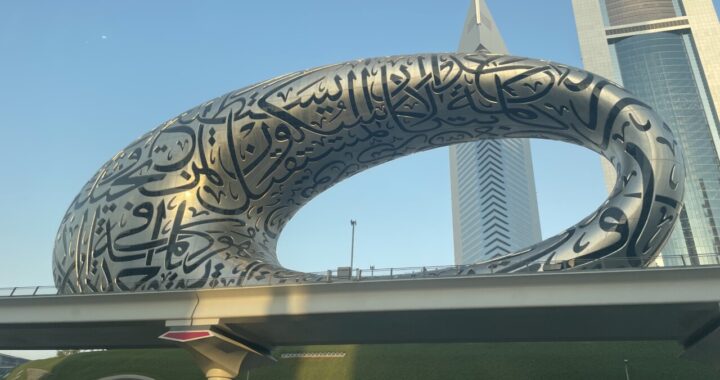Dubai, United Arab Emirates, is a bustling city, which rose out of its desert sands in the past 30 years. During my first visit by 1994, the Dubai Creek was there, surrounded by gold souks, hotels and its airport DXB. A second visit made my eyes wide open on its numerous new skycrapers in various shapes by 2007. And during my third visit today, expansions will never stop, a city of cranes, scrapers and attractions. Such as a fresh rebuilt ‘old’ downtown area along the Creek with its authentic dhows.
Flown in by its home carrier Emirates, DXB-airport is an example of efficient passenger traffic flows. However, its existence has been limited. A $35 billion completely re-designed phase 2 new DWC Al Maktoum International Airport is to become world’s biggest gateway with more than 126 million passengers handled, when it will start operations after 2034. The current airport will be turned into a cargo-only facility. Dubai is strategically situated halfway Europe and Asia, an advantage. Together with Turkish Istanbul, UAE’s Abu Dhabi and Qatari Doha gateways, much traffic will be attracted from political constrained European gateways, such as Schiphol Amsterdam and Zaventem Brussels airports. A senior US-businessman said once: ‘Whether you go to heaven or hell, you ‘ll have to change planes at Atlanta,’ Georgia, US biggest gateway with more than 100 million annual passengers handled. And so will Dubai DWC in the next decades. @Dubai I attended [as a loyal reporter] IATA’s 80th Annual General Meeting and World Air Transport Summit.
IATA, consolidating databases
During its past 80th AGM meeting and World Air Transport Summit at Dubai, IATA turns out to a perfect keeper of databases to support and oversee the airline business. Besides IATA’s DG Willy Walsh rushed to temper governments ambitions to achieve 5% SAF (Sustainable Aviation Fuel) in its jet fuels by 2030 already. “Net Zero by 2050 will be better”, stated Walsh. Host and not-yet retiring Emirates CEO Tim Clark (75) played a key role: “Aviation is doing as much as it can and we have at least 50% fewer per seat emissions compared to earlier jets.” The profitable airline industry talked about 2023 as its safest best-ever year with no jet hull losses. And counting to date…
During the various meetings on the challenges the industry faces, Iata initiated or was requested by several IATA and non-IATA airlines tot initiate and maintain databases on some key challenges. To get overviews and insights over a certain term or period on a matter. We discuss the key databases.
Turbulence Awareness
Severe turbulence is rare and the industry was shocked after the recent incident on the Singapore Airlines flight from Londen to Singapore. Pilots use weather forecast to avoid turbulence, but can be inaccurate, for weather radars cannot detect clear air turbulence. Airlines request IATA to be a global turbulence data consolidator. Singapore Airlines is to compensate its ailing passengers financially. Other platform databases, in which most airlines participate are meant for FuelIS (efficient fuel use), Timatic Autocheck (biometric border control), SafetyIS, Worldwide Slot Guidelines, IOSA, Safety Management System, Accident Investigation Reports, Safety Leadership Charter, GNSS Incidents, very useful for analytics and management info. Also to gain power on tough stances of governments in cases of taxation, reduction of capacity, EU-approved Balanced Approach for aircraft noise abatement procedures, etc.
So the International Air Transport Association wil continue to play a key role in the global aviation business. Next year’s AGM will held in Delhi, India, and led by IATA-govenor and IndiGo CEO Pieter Elbers, past CEO of KLM Royal Dutch Airlines.

